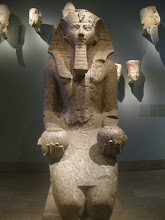Welcome to Ruby's Zoo. Nice of you to stop by. Cockroaches by the kitchen faucet and in Ruby's middle drawer (the one in which she keeps tops and tees). Spiders in the bathroom. Mice under the kitchen sink. Please do not feed the animals. Pictures without flash only. Be sure to visit our gift shop on the way out. Thank you!
I know I just ate, which might have something to do with it too, but I kind of lost my appetite.
One month, habibty, one month left.
I criss-cross my way past a thousand bodies on the streets after work, some wear suits, some wear jeans, some wear the hejab, some wear crosses around their necks or the kippah on the top of their heads. I stand in the subway and look into pink, brown, olive colored faces. I hear a symphony of a dozen muffled songs that leak out through iPhone headphones. I listen to a medley of a handful of spoken languages wherever I go. I eat Chinese buckwheat noodles and Arabic hummus and Italian fresh pasta. I think to myself that in a city such as this city, you must be open-minded or you'd move. There's little space for people who are intolerant and discriminatory (but there has to be some space, or else the rest of the inhabitants would be intolerant too).
There's a debate between the two presidential candidates on tonight, and somehow it seems that the entire city of New York supports Obama with Obama t-shirts, Obama earrings, Obama bumper stickers, Obama pins and Obama everything. I saw one lady with a McCain t-shirt the other day.
I think she was an out-of-towner.
My Cairo music composer friend Moustapha Halawany sends me this link on msn:
http://www.youtube.com/watch?v=gDyZ_E-D_Ow
It's Cairo traffic, it's Cairo people. It's beautifully shot. And the music is perfect. Hani the Egyptian intern says that Cairo is like a chaotic developing world version of New York. Dad says Cairo is like the New York he remembered from when he was growing up.
Today at lunch we had a brownbag meeting with Martin Pratt from the International Boundaries Research Unit at Durham University. Maritime border disputes. Rivers. Resources. Conciliation. Negotiation. Track Two Diplomacy. Just before he was wrapping up I said to myself: I have to ask.
"Excuse me," I said. "Is there time for one more question?"
Not really, but they consented.
"Is demarcating physical boundaries the only solution to territorial disputes? Or do you have any other ideas on ways to settle such a dispute. I'm thinking of the question of Palestine whose prospective territory is not only split up, but also perforated by all the illegal Israeli settlements."
Martin Pratt gives you the impression that he thinks he doesn't have as much to say as he actually does. His cheeks flush and he gets a little jittery when he speaks. But his words are stable and they go something like this:
There are a number of ways we've tried to solve territorial and resource problems without resorting to demarcating physical boundaries over the course of the past century or so (before that, borders really didn't matter as much, but since the whole world was divided into separate nation states European style in the last century, states got really picky about where to draw the line--and this is essentially because national borders decide what resources are legitimately yours, which peoples are legitimately your citizens (and similarly which peoples don't have the right to a share in your resources).
We've had buffer zones and internationalized territories, and soft borders sound nice and fluffy enough, but when it comes down to it, the only thing that really matters in the long run is clear, agreed-on physical boundaries that are recognized by all parties. It costs so much in terms of personal freedom and human rights, and it requires such a heavy military presence to enforce any other type of solution we've thought out so far.
I go a little sad, but I realize he's probably right. As long as we entertain the idea that we are separate peoples and that we as these separate groups of people have the right to self-determination (which makes sense if we see ourselves as separate peoples), there's no fair and just way of organizing our self-determined enclaves that's better than the territorial solution.
Sorry all nomadic peoples.
But managing two groups who wish to exercise their right to self-termination on one and the same territory will, all other problems aside, leave you with one very complicated issue: namely that of how to decide who belongs to which group. This is a question that's not easy to decide as it is--what if you have parents who were born outside? Or if you were born outside but grew up on this territory? Or what if your parents were born here, but they moved and you grew up somewhere else? Deciding who is a rightful citizen of a territorial state is pretty tricky as it is, but imagine not having the final sort of territorial test to fall back on. How do you decide? Hair color?
Let's say that you settle on having one territory, but two governments and two sets of law. They could, in a best-case scenario, negotiate which government gets access to what resources and so forth, but how would they decide who--that is to say, which individuals--has a right to these negotiated resources? Who has a right to their national health care plans? Who is subject to which set of law? Hair color obviously won't work. But neither will religion. Or ethnicity. Because all identity boundaries are essentially fluid when it comes down to it, and this is why territory provides us with an easy, all-but neutral way out.
If you're born within these and these lines, or if you later on come here and create a life here, you have the right to this and this and this, and in return you have to do this and this and this.
I know that the Israeli state is trying to settle these identity issues with ideas of religious and national heritage (or conversion or affiliation-by-marriage), but this is obviously going against most ideas of fairness and justness that have developed in the past half century or so.
In any event, I have scheduled an interview with the Permanent Observer Mission of Palestine to the United Nations in two weeks. They kindly consented to assisting me in my research for my master's thesis. I'm excited.
My supervisor wants to see me before I go, because this is "a controversial issue." It's not like I'll be representing the UN when I see Mr Ammar Hijazi, but I don't mind talking to her.
The debate between Obama and McCain is over. If Obama doesn't win this election, I think New York will have to refer to the international law on self-determination and declare its indepedency.
Thursday, October 16, 2008
Subscribe to:
Post Comments (Atom)


















No comments:
Post a Comment